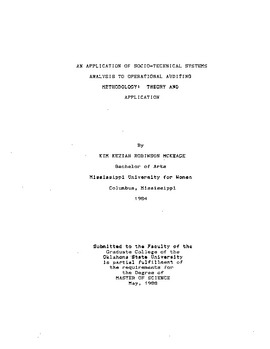| dc.description.abstract | Internal auditing emerged early in the Twentieth Century as a subsidiary activity of accounting (Sawyer,1981, p.18). Internal auditors were usually employed in the accounting department and checked routine accounting activities. Their primary concern was compliance with financial accounting controls. Over more than five decades, internal auditors' responsibilities have grown to include evaluation of operations and management controls. This evaluation encompasses what have come to be known as the ''Three E 's" Efficiency, Economy, and Effectiveness (Morse, 1971; Nich, et al., 1987). According to Morse (1971) the purpose of Operational Auditing is "to identify opportunities for greater efficiency and economy or for improved effectiveness in carrying out procedures or operations." Internal Auditing has not, however, always succeeded in its new role as Operational Auditing. Nich, et al. (1987) state that two of the reasons for this lack of success are that "internal auditors are neither organizationally positioned nor particularly competent to play a broader role Cas operational auditors]" (p.4). Nich, et al. (1987) recognize the relevance of attempting to evaluate efficiency, economy, and effectiveness. They state, however, that operational auditors cannot always perform that function because of deficiencies in extant operational auditing methods. They believe that the deficiencies stem in part from the transactional orientation in Operational Auditing methods that has been carried over from Financial Auditing methods. One obvious solution to the problem of deficient methodologies, and one proposed by Nich, et al. (1987) is to adopt various methods of other, related disciplines. Two areas they suggest are Information Systems and Industrial Engineering. Other disciplines could be suggested. This paper, however, proposes the adoption of one particular methodology, Socio-Technical Systems Analysis (STSA), as an appropriate methodology for Operational Auditing. STSA is a design and analysis approach that attempts to jointly optimize both technical and social system needs of the organization. "The STS approach views the organizational control system as a network of interacting and interdependent subsystems'' (Thomas, 1985). The four steps of a Socio-Technical Analysis are the Organizational Scan, the Technical System Analysis, the Social System Analysis, and the Design, Analysis, Redesign Effort. The four steps systematically link a study of the organization's goals and objectives to an analysis of policies and procedures and, ultimately, an identification of problems and possible solutions. Chapter I of this paper will discuss in detail the extant operational auditing methodology. Chapter II will discuss in more detail the goals and objectives of operaiv tional auditing, and possible reasons why the goals and objectives are not currently being met. The progress of Operational Auditing toward a more systems oriented view of the organization is demonstrated. Chapter III of this paper will present the theory and background of STSA, and STSA is proposed as a methodology that could be incorporated into Operational Auditing methodology in order to alleviate some of the existing problems. Chapter III includes the rationale for proposing STSA as an Operational Auditing methodology. Chapter IV will present an example of the STSA process adapted for operational auditing use. | |
